Rejecting Forgiveness: Denouncing The Christian Rhetoric of Erika Kirk and Others

Author’s note: this essay is extremely critical with what is at least accepted as sound Christian theology by a critical mass of those who believe in that religion. Instances imploring unconditional forgiveness, as set forth in this piece, should offend anyone’s moral compass. I have attempted to exercise as much restraint in the language used as possible, in order to be both respectful to those readers of the Christian faith while still offering sharp criticism and rebuke that such theology so richly deserves. The contentions set forth should not be controversial to anyone, but alas that will almost certainly not be the case. It is hoped that those who disagree on this issue but nonetheless find common ground on most issues will continue to read and support this author.
As two weeks have passed since the assassination of Charlie Kirk, much of the messaging in response has been far too tepid. Much of the rhetoric has only served to obfuscate the critical, essential discernment that the left is an ideological enemy that must be defeated, destroyed, and vanquished, that the differences between each side are vast and irreconcilable. There is perhaps no greater example of this than the comments about forgiveness in Erika Kirk’s eulogy at her husband’s memorial on Sunday, September 21. Before the murder suspect, Tyler Robinson, even offered repentance, or remorse, she declared unequivocally that “I forgive him.” The salient excerpt from the transcript of her eulogy reads as follows, although readers should note her thoughts are jumbled at one point conflating Robinson with references to Christ as “that young man:”
My husband, Charlie. He wanted to save young men, just like the one who took his life. That young man. That young man on the cross. Our Savior said, “Father, forgive them, for they know not what they do.” That man. That young man. I forgive him. I forgive him because it was what Christ did in his. What Charlie would do. The answer to hate is not hate. The answer we know from the gospel is love and always love. Love for our enemies and love for those who persecute us.
This philosophy, to the extent one can call it a philosophy at all, is remarkably short-sighted and even dangerous. It also informs why this author rejects Christianity both as a religion and religion as philosophy.
Perusing exchanges on Twitter while also recalling past conversations on this matter, some apologists for this ethos try to distinguish between “forgiveness” and “reconciliation.” Much of this seems like a pointless, semantic shell game about definitions. Others note that their interpretations of Christianity and the Bible in particular requires a wrong-doer to express repentance and remorse before one is obligated to offer forgiveness. Those of this more tenable theological persuasion cite, as just one example, Luke 17:3, which reads as follows:
Take heed to yourselves. If your brother sins against you, rebuke him; and if he repents, forgive him.
Christians who adopt this more sensible approach also cite other passages from other books in the bible. Luke 17:3 seems however to be the best representative of this particular persuasion. This essay in particular, “Forgiveness Revisited – The Necessity of Repentance and The Heart Grief” does an excellent job of arguing that such rhetoric is wrong theologically.
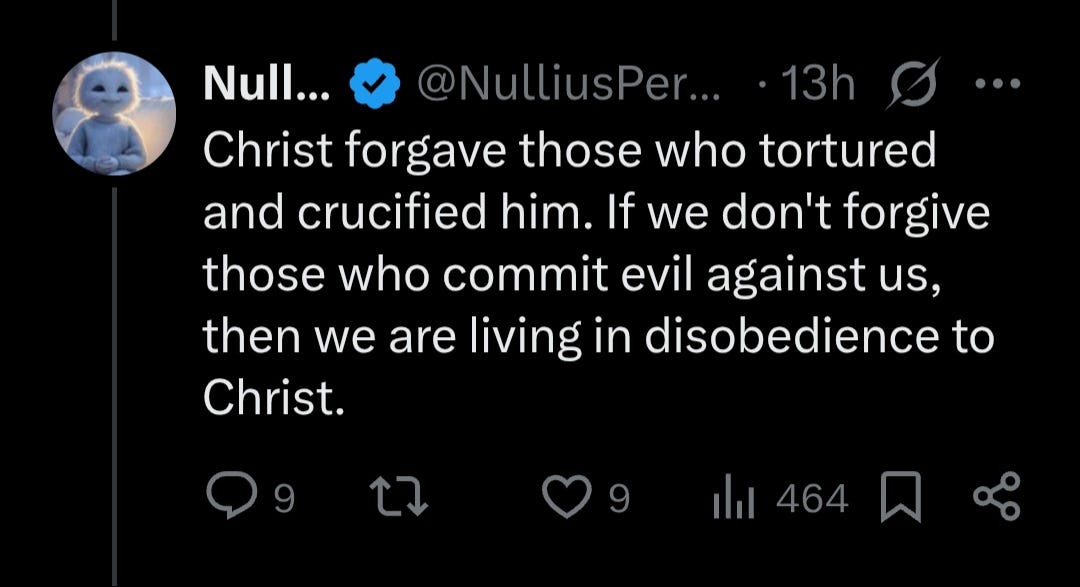
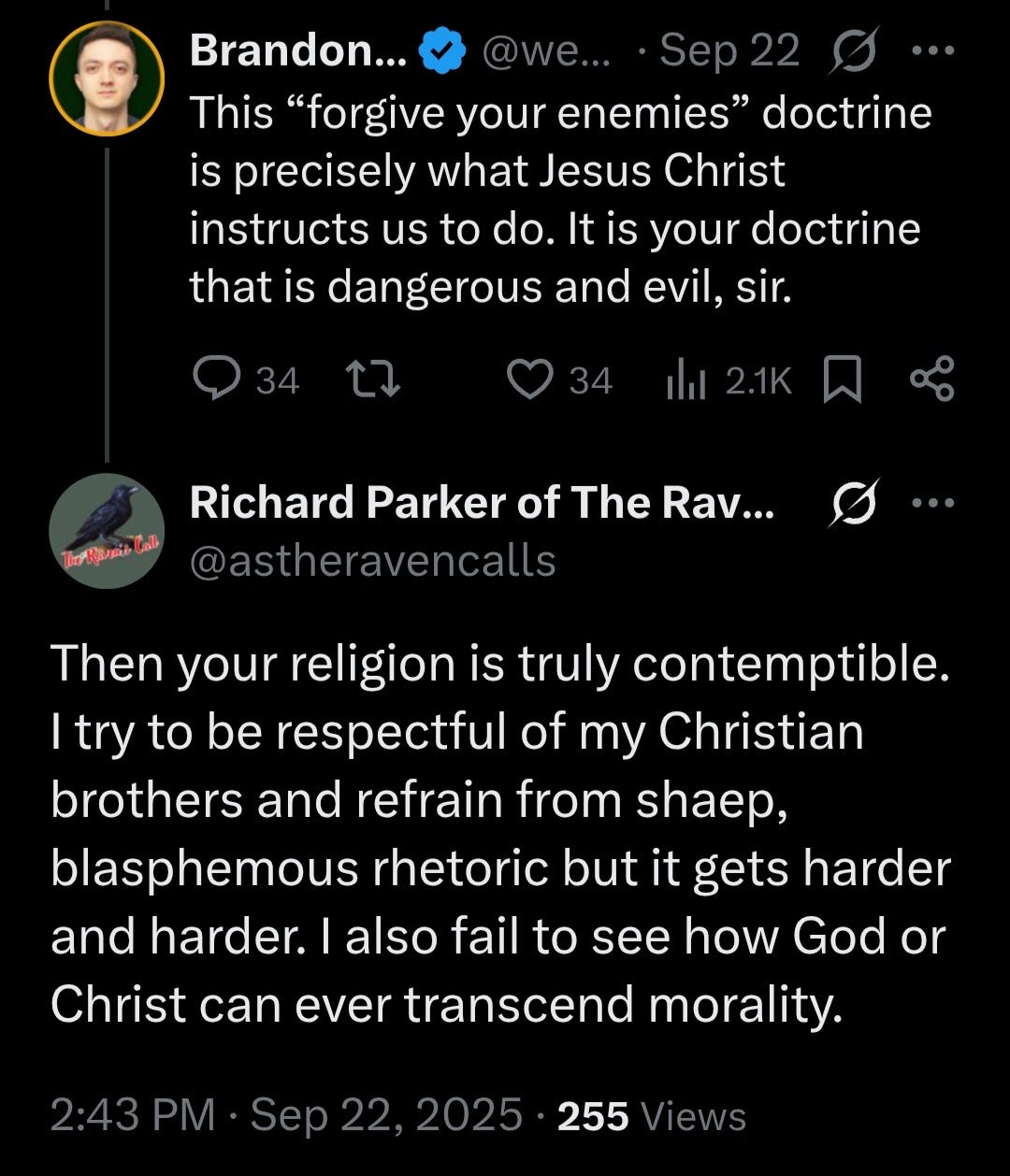
Others however assert that because Jesus Christ forgave his tormenters unequivocally and without condition, even without the condition of remorse and repentance1, those who believe in him as their savior are obligated to do so as well. Others counter that Christ did not forgive them, but beseeched God to forgive them, although that seems to be largely a distinction without much of a difference.
To this author, at least, it is unclear which side is correct theologically. Regardless, Erika Kirk’s interpretation seems to be the dominant school of thought, at least in the United States. Indeed, the argument that forgiveness as a categorical imperative has no biblical or theological basis seems untenable, particularly given this famous passage from The Lord’s Prayer:
Give us this day our daily bread,
and forgive us our trespasses,
as we forgive those who trespass against us,
The phrase “as we forgive those who trespass against us” is stated as a blanket rule, in absolute terms. It should also be noted the use of the word “trespass” is fraught with difficulty. Most would not consider serious wrongs as merely a trespass in common, modern-day usage, but this likely stems from the sorts of problems that translation work invariably entails. Common understanding of the prayer seems to use the concept of “trespasses” in a more peculiar sense that requires forgiveness for even more serious transgressions and wrongs.2
As with all moral, ideological, and other matters of import, the question must be examined and assessed with the faculties of reason and discernment.3 Even for less serious wrongs than the murder and assassination of one’s husband or wife, carte blanche forgiveness, untethered to the conditions of sincere remorse and contrition, simply invite further transgressions by the wrong-doer. It is a sign of weakness, regardless of how much religious conservatives insist to the contrary. Reluctance to forgive and to reconcile demonstrates to the wrong-doer both strength and resolve. It also sets a precedent that, should there be forgiveness or reconciliation, such transgressions will not be tolerated going forward. This author refers to this as The First Law: for serious transgressions and harms, do not forgive, and if one does forgive, it should be done reluctantly, and only if the following criteria are met. First, the offender must express sincere repentance and remorse. Where applicable, there must also be some form of restitution for the harms and injuries incurred. In addition, the offender must offer assurances and guarantees that such transgressions and harms will never happen again. Finally, the person forgiving must assess the relationship and determine the relationship offers positive value, sufficient to justify the extraordinary indulgence of forgiveness in the wake of serious transgressions and wrongs.
Conversely, a decision not to forgive when these criteria have not been met must be stern and unwavering. This one law, The First Law, has been a guiding principle in my life and was developed late in adolescence after realizing the grave error of forgiving too readily, which simply gave license for further transgressions. In some instances, such as parental abuse, murder or harm of one’s person or loved ones, the person obeying that one law—THE FIRST LAW—would not only be obligated not to forgive, but would also have full justification to do as he will, provided he can get away with it. While not quite all is permitted in such circumstances, truly extraordinary forms of retribution, unspeakable forms of retribution, even, are permitted, provided it can be carried out without negative consequences in practical terms. For it is folly to love one’s enemies, when they should be destroyed.
Unfortunately, this sort of demonstrative rhetoric about forgiveness and loving one’s enemies rather than destroying them is very common in the United States and particularly among the religious Christian “right,” which comprises a significant contingent of opposition to the Democrat party, liberalism, Cultural Marxism, and so on. Victims’ statements post-conviction for truly heinous crimes, such as rape, murder, and other violent crimes are replete with statements as to how the victim or the victim’s survivors forgive the convicts. Very often this is done without even a word of remorse, repentance, or regret by the convicted criminals for the heinous crimes in question.
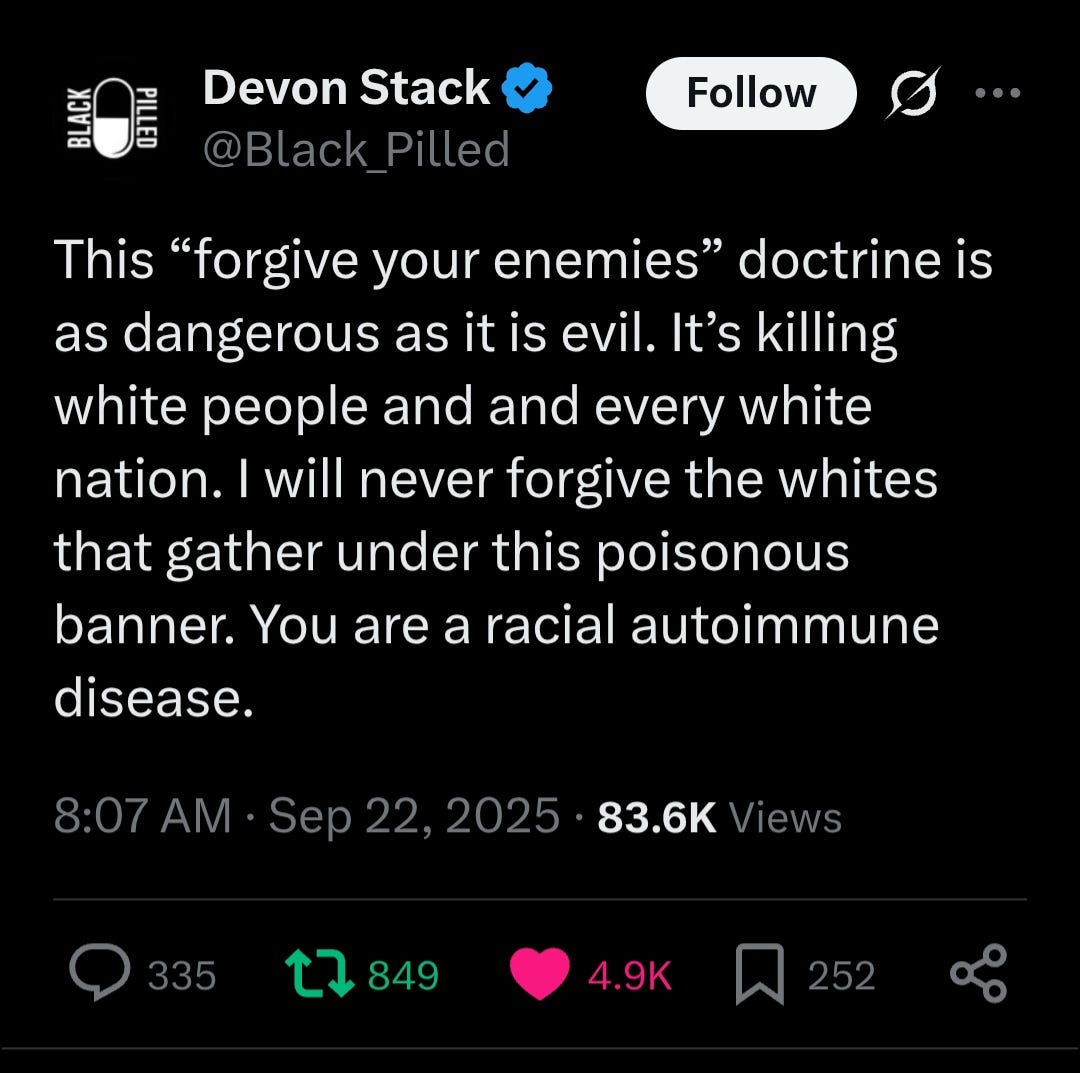
Right-winger Devon Stack highlighted this recently4 in reference to the so-called “Wichita Massacre,” in which brothers Reginald and Jonathan Carr, who are Black, went on a crime spree defined by rape, murder, and robbery. For those unaware of this horrific incident, a brief summary is in order. After robbing Andrew Schreiber and attempted carjacking and subsequent shooting of 85 year-old cellist Ann Walenta, the brothers carried out a home invasion occupied by five white young people: Brad Heyka, 27; Heather Muller, 25; Aaron Sander, 29; Jason Befort, 26; and his girlfriend Holly G., 25, who would be the sole survivor. The two brothers raped Heather and Holly, and coerced both girls into sexual activity with each other, while also coercing some of the men into sexual activity with the female captives. Then the Carr brothers led the five to a bank to make withdraws from an ATM, before they were then taken to an empty soccer field, stripped naked, made to kneel before the Carr brothers shot each in the back of the head execution style. Holly G. Survived only because there was a plastic barrette in her hair which deflected the bullet. Holly played dead before walking two miles, naked in the snow, and was taken in by the owners of the first home she found.
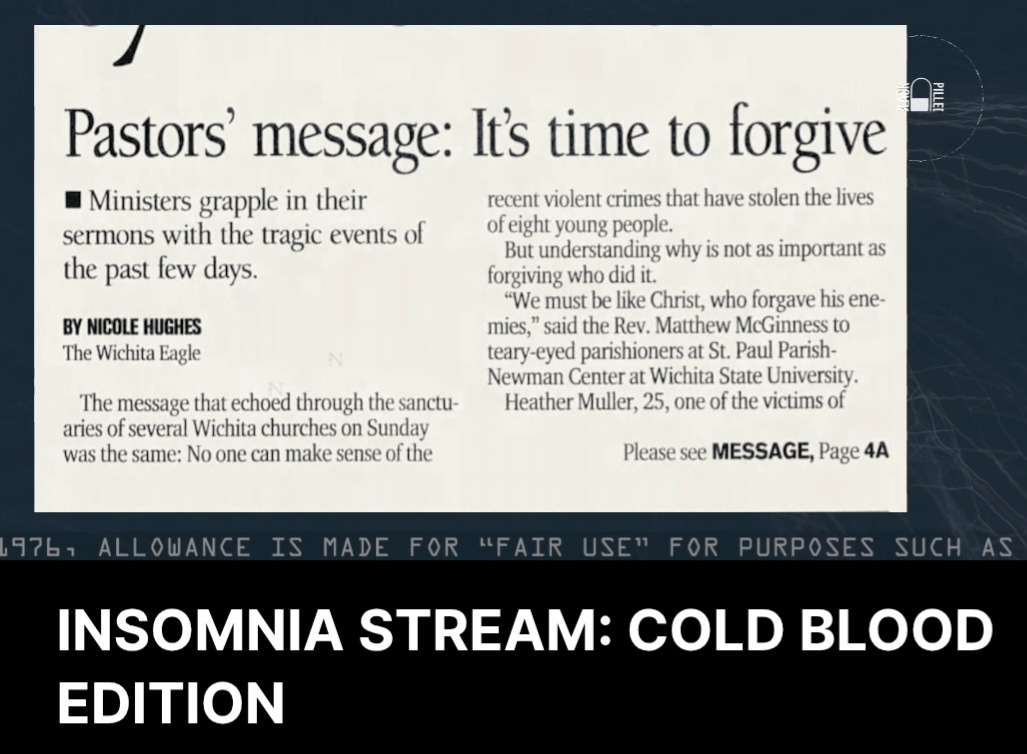
A day after the news had come out, churches and religious leaders were blathering on with their sick, pathological nonsense about forgiveness. Some even speculated that Heather Muller was likely not thinking about how she was just raped and is about to die, but rather was praying for her rapists and soon-to-be murderers in the immediate moments just before receiving a Kopfschuss in the back of the head. This kind of demonstrative rhetoric is utterly and truly contemptible. Consider the blithe assertion that not only should it not be celebrated as it has been, but it should simply not be tolerated at all, most particularly by a father or other male relatives or other loved ones of such a victim. Any sanctimonious, religious do-goody pontificating about how a rape and soon-to-be murder victim might be praying for the black monsters who raped and killed her and her friends should be met in a most severe manner that goes well beyond accosting or chastisement.
There are many other examples. Austin Metcalf’s father, Jeff Metcalf, immediately talked about forgiving his son’s alleged killer, Carmelo Anthony, as soon as that murder became a national and international news story. Instead of expressing remorse, Anthony and his family profited off of this with an outrageous GoFundMe fundraiser. Metcalf senior was rightly derided by many on the hard right for such comments. The murder of Mollie Tibbetts at the hands of an illegal migrant is another example. As soon as her murder was announced, the pastor at her church trotted out the same tiresome, offensive rhetoric:
“Obviously what’s happened is horrible. And the man who did it is…it’s horrible that it happened. But we also need to find the grace, to ask God for the grace, to forgive him,” Close said after the service. “I just know how much I need forgiveness on a daily basis. So I just hope that if I made a big mistake that people would pray for me and forgive me too.”
There is so much wrong with this statement that it defies credulity. The murder of Mollie Tibbets and other similar crimes is not just a “big mistake” that people just stumble into. Nor should the focus be on hoping others pray for one’s self in the hypothetical commission of such crimes. To the contrary, focus must be directed solely at seeking both revenge and justice against such perpetrators, as well as devising solutions on a broad, macro scale level to address and ameliorate the policy concerns that give rise to such tragedies in the first place.
Another chilling example concerns the bullying and beating of a child, Jayson Patterson, of Anderson, Indiana, video footage of which is available at this link. Accounts indicate he was riding his bike in a park with his dog. Two black youths accosted him and his dog, as the black youths even threw rocks at the boy’s dog. A physical altercation ensued immediately after, and one of the black youths pummeled him badly, before an older black youth joined in the foray, beating the lad even more severely. The beating was severe enough to require immediate medical care.
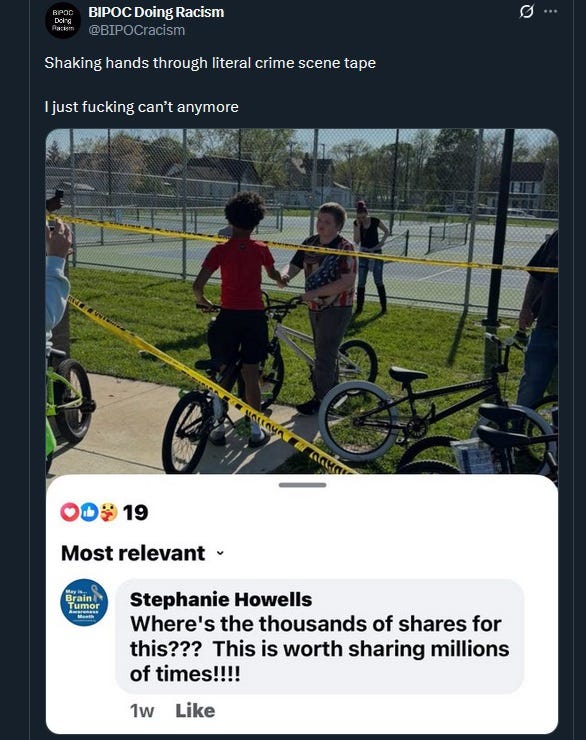
The response by the “community” was revolting, most particularly the involvement of the boy’s mother, Dezi May—a single mother and obnoxiously outspoken Jesus freak of the very worst sort. They trotted out the boy, forcing him to feign forgiveness in what can only be described as a humiliation ritual before the town and the entire Internet. The body language of the troubled lad speaks volumes. In the image featured below, the black youth has a disgusting smirk on his face, probably because these morons gave both him and Jayson a new bike. Both parents were supportive of this humiliation ritual and almost certainly pressured him into it.5 This, as in many other such instances, should warrant no talk of forgiveness. The young lad is obviously troubled, and it is quite apparent he does not have proper masculine influences, masculine influences that would remedy his apparent weight problem at such a young age and would help him learn how to better defend himself, such as getting him boxing lessons.



Adherents to this sordid religious philosophy insist that persons such as Erika Kirk forgive not for the benefit of those who have committed such evil but for the benefit of the person forgiving. This train of thought is unpersuasive. Trauma, real trauma such as the murder of a loved one or the legacy of abusive or negligent parenting, never really goes away. It can be mitigated, controlled, and contended with in ways to improve life as much as possible, but it can never be truly dispensed with. One adage comes to mind in particular, which is loosely paraphrased as follows; “you may think you are done with the past, but the past is not done with you.”6 Feigning forgiveness, giving lip service to these self-destructive platitudes can never truly grapple with the pain and torment that arises from these sorts of wrongs.
Friedrich Nietzsche has written how forgiveness facilitates a slave mentality, that forgiveness is lauded for people who are in no position to exact any measure of vengeance. Conceding that most will be unable to carry out personal justice a la Paul Kersey from the Death Wish series of films or even Hannibal Lecter in conjunction with his own peculiar, twisted moral code, or for that matter Prince Hamlet to include a classical reference, it does not follow one should simply forgive because he cannot inflict his wrath on those who harmed him. Traumas and wrongs that reach a certain threshold command respect. To forgive is tantamount in certain respects to forgetting. Conversely, refusing to forgive is to discern properly the gravitas of the matter, to give it the solemnity and honor it is due. And even when one is powerless to carry out certain, undisclosed measures to exact the sort of revenge that would be desirable, declaring a steadfast refusal to forgive at least preserves one’s honor and dignity.

In contemplation of these matters, this author reflects on the memoirs of a German soldier who survived the war, Gottlob Herbert Biedermann: In Deadly Combat. The epilogue of the memoirs recounts the depravity and brutality and suffering while under Soviet captivity after the war. It is of note American forces surrendered Biedermann and his surviving comrades to the Soviets, knowing full well this would likely be a death sentence. On the day of his release where he and a selection of his fallen comrades were to be sent back to what was left of Germany, a brother-in-arms was caught concealing the Iron Class First Class as contraband: a war decoration he earned in valiant service of the Fatherland. That prisoner of war was taken away and never seen from again. In Biedermann’s old age, an officer in the United States army made some overture to the German veteran in conjunction with some event fostering “German American friendship.” Noting that the Americans surrendered him and his brothers-in-arms to the Soviets in particular, he rightly refused. He properly refused to forgive the Americans for what they have done. Alas—despite being the very paragons of military discipline and unrivaled titans of warfare unmatched in the annals of history—Biedermann and the other fallen heroes of the vaunted deutsche Wehrmacht were of course ultimately defeated and thus unable to properly sanction the United States with the sorts of retribution it so richly deserves. Nevertheless, Biedermann, in old age, preserved his honor and his dignity by refusing to forgive. In doing so, he honored the untold sacrifice and unimaginable suffering of himself and his fallen comrades. This of course is in contravention to this Christian creed about turning the other cheek, loving one’s enemies, and even forgiving without so much as an expression of remorse or repentance.7
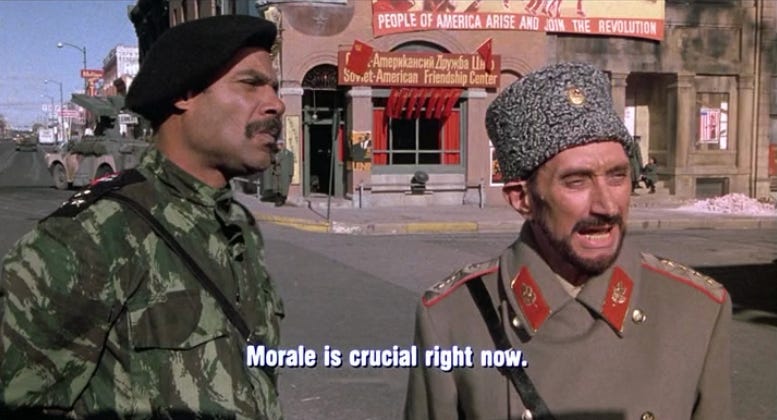
There are other examples on a more macro level. The manner in which Texas reveres the memory of the Alamo comes to mind—Remember the Alamo! The Serbians have centered their very national identity and pride on The Lost Battle of Kosovo in 1389. While this particular example demonstrates that excessive fixation on such matters can lead to sordid pathologies on a nation’s collective conscience as well as the individual, the Serbians should at least be respected for honoring and remembering their past, even if it lacks the sort of moderation and balance that can stave off or mitigate such pathology.
Consider also that anger and hatred can be channeled constructively, even when a person cannot exact what would be properly regarded as personal revenge fantasies in most instances. Hatred for an evil step-parent (or second or third husband or wife of a bad parent) can drive a youngster to excellence in academics or other such endeavors in a personal bid to overcome such hardships, and to defy those who harmed him in lieu of exacting personal justice and revenge of a much more gruesome, but righteous sort. Those who lift weights or engage in other physical training know that tapping into dark energy, including tapping into anger and hatred, can be powerful forces providing motivation, determination, and focus.
Further consider that meaning arises from differences. There can be no light without darkness. The idea of love loses meaning when it is applied to anyone and everyone. It is only when contrasted with its polar opposites, such as hatred, disdain, or even indifference that the concept of love has any meaning whatsoever.
Ultimately, these tendencies reveal an untenable pathology in Christian theology, or to be as charitable as possible, a dominant strain of Christian theology. Indeed, this sort of rhetoric has obfuscated the ideological focus necessary to contend with ideological enemies with clear conviction and discernment that is required in these exigent times. In the immediate aftermath of Charlie Kirk’s assassination, there were statements similar to that of Virginia state assemblyman Nick Freitas, who emphasized that the ideological differences are irreconcilable. He stated an outright refusal to “’stand in solidarity’ with the other side of the aisle.” Elaborating further, he notes that this is anything but “a civil dispute among fellow countrymen.” Indeed, it is a “war between diametrically opposed worldviews which cannot peacefully coexist with one another:” a war in which “One side will win, and one side will lose.” It is with this understanding that Freitas declares to the left that “he wants to defeat [the left]” and to “defeat the godless ideology that kills babies in the womb, sterilizes confused children, turns our cities into cesspools of degeneracy and lawlessness…and that murdered Charlie Kirk.” Admittedly, Freitas statement was ended with this unfortunate qualifier:
My Christian faith requires me to love my enemies and pray for those who curse me. It does not require me to stand idly by in the midst of savagery and barbarism…quite the opposite.
Consider that such platitudes guaranteed that the sharp rhetoric that defined much of this statement would necessarily lose momentum.
As stated in the beginning of this piece, there is some controversy whether these platitudes are even theologically sound. This author cannot opine on such matters, and in any case this sort of rhetoric is very much a majority view. For better or for worse, Christianity has been embraced by Europe for over 1500 years. Regardless of whether this sickly-sweet pandering is theologically sound or not, reforming such pathological tendencies will be difficult precisely because they are so very pervasive in modern American life. While this author does not believe in Odin theistically, the warrior ethos of Norse mythology seems much more desirable in terms of religion (or mythology) as philosophy. Alas, the modern world is left only with fragments of Norse mythology, namely the Eddas and a few other texts. But what is available emphasizes reciprocity, honor, and a warrior ethos, with little attention paid to forgiveness. It is unthinkable that Odin, Lord of Hosts, the Allfather, would endorse unilateral forgiveness without reciprocity, without repentance. However one may characterize the Norse gods, turning the other cheek and loving one’s enemies is the antithesis of that ancient, Germanic ethos, as it should be anathema to the European soul writ large.

Given the existential threats facing Mother Europa and her posterity, and in contemplation of the sorts of drastic measures that will need to be taken to overcome these threats, this ethos of unilateral forgiveness and loving one’s enemies needs to be forsaken and rejected with emphatic zeal. Whether that is to be achieved through reformation of conventional Christian theology or a widespread rejection of it remains to be seen. However it is achieved, the Sons and Daughters of Europe must adopt The First Law set forth above on matters of forgiveness. And above all, they must learn to hate—to truly hate—their enemies and seek their very destruction and obliteration, not love them.
Other articles and essays by Richard Parker are available at his publication, The Raven’s Call: A Reactionary Perspective, found at theravenscall.substack.com. Please consider subscribing on a free or paid basis, and to like and share as warranted. Readers can also find him on twitter, under the handle @astheravencalls.
From what this author is able to ascertain, “The Lord’s Prayer, is derived from two specific passages of the bible, name,y Matthew 6:12 and Luke 11:4. The original Greek term is ὀφειλήματα (opheilēmata) in Matthew 6:12, which is derived from ὀφείλημα (opheilēma), meaning “debts,” “obligations,” or something owed. In Luke 11:4, the term is ἁμαρτίας (hamartias), from ἁμαρτία (hamartia), which is typically translated as “sins” or “wrongdoings.” Know and understand this author does not speak ancient Greek, as this information is offered after a cursory inquiry on the Internet.
There are so many problems with trying to ascertain moral authority from a text like the bible that they defy an attempt to quantify. The Bible is of course actually a multitude of texts written thousands of years ago, in different ancient languages. Very often different passages in contradiction to another, hence the old adage about the devil quoting the Bible. Above that, it has always befuddled the author how either Christ or God can somehow transcend morality. Beyond that, a foundational premise of Christianity is that man, unlike Christ is born in original sin, and yet must nonetheless strive to be like Christ, which is impossible. The faculties of reason and discernment, coupled with a grasp of history and collective experiences is a far more sensible barometer of morality.
The salient passage starts at 1:17:00 and goes on to about 1:23:00. Readers can be expect an excerpted portion of this video to uploaded, either in this essay or in a subsequent note
Much of the material that has been archived by this author has been lost or at least cannot be found, particularly as correspondence on this matter with a mutual follower was deleted when that mutual follower was recently banned. Limitations with Twitter’s search feature has prevented this author from finding critical material that was posted at the time of this event.
This is one of the core messages of the film The Babdadook. Those who have not yet seen it should know this film receives a very high recommendation by this author.
This author submits a critical mass of Germans must come to this same epiphany concerning the crimes and atrocities done to the German people, even though they will never again wield the sort of military prowess capable of vying for hegemony or exacting collective retribution against the peoples who have done so much harm to them. Survival of the German people and likely all European peoples will likely hinge on whether they can discern that the United States is not their friend, and vye for a way to end American occupation and expunge most portents of American Unkultur from German and European culture, from McDonald’s to the ubiquitous plague of English-language advertising and other materials that threaten not just the German language but all language of Europe.






Excellent points. Harsh but fair.
Guilt, self-hatred, self-sacrifice, pathological altruism – the ouroboros in religious clothing.
The Churches welcome Muslims and attack people who criticise their beliefs or activities, or those of Jews and Communists.
Yet they hang on to two mis-readings of their own scriptures.
The point about the Good Samaritan story is not that Israel should welcome Samaritans (or any other ethnicities)as immigrants, but that two haughty Jews should have looked after their own compatriot who had been mugged.
The judgement of the sheep and goats is not an instruction to look after anyone and everyone, but a warning that eternal torture awaits whole nations which have ill-treated the followers of Jesus.
Thanks. I strongly agree with your position. The guy in the meme, the father who killed the rapist, exemplifies what has been lost. The ongoing process of western/judaic civilization has emasculated the Christian male. The destruction (murder) of Germany’s leadership was a horrible blow to europe.
1) The assassination narrative propagated by the establishment is false and the prime movers of the Charlie Kirk memorial spectacle are all under the influence of the globalist Jew Mafia…, including the wife.
2) C.K. started TPUSA in 2013 at the age of 18. At age 31, he finally got it regarding Jew behavior and was about to spark a mass (Duke style) awakening among American youth.
3) Jew Mafia kingpins offered Charlie 150 million to continue towing the Jew lies, which he rejected, and for which they were furious. He feared for his life.
4) Polls of every demographic show support for Jews precipitously dropping. We all know, Jews would rather risk destroying the earth rather than repent and confess.
5) To my understanding, the accused shooter has plead not guilty. The crime scene has been destroyed by construction, critical cameras were removed and have disappeared, autopsies were either not done or have not been published, and the wife’s family has HLS connections and she has been appointed the new CEO of the organization.
How far back in time do we go when holding grudges and demanding revenge? And what do we do when it comes out that we killed the wrong person for the crimes committed by hidden 5th columnists?
What does the Bible say about “binding” Satan for 1000 years before throwing him into a lake of fire?
Jewish Zionists taking control over TPUSA and TIKTOK..Israel wanst War USA vrs Iran? The Final (genocide) Solution in Gaza? Charlie Kirk is dead who benefited mosre???
It is certainly true that if bad behaviour is not punished, it will continue!
It is possible to both forgive AND punish! Presumably, JC forgave the Jews in the Temple. But he still gathered a dozen disciples, all with whips, barged in through the door, whipped all round them and overturned the furniture.
Hatred is a useful emotion, but best taken in small doses.
In answer to the question: How would JC have reacted to the current massacres in Gaza, the answer seems to be that he and the lads would have started whipping Jews at the nearest synagogue and executing any Israelis involved in killing Palestinian children. Plus lots of public insults.
The Whipping in the Temple seems to be the only new and unique part of the Christian story. But very few professional Christians want to talk about it, presumably because powerful Jews are still very angry about the incident. Non-Christians should ask public Christians how The Whipping applies to modern life…
Can Odinists, atheists and all flavours of Christians work together to organise a public whipping in a convenient synagogue?
Attacks on (Christian) children are punishable by execution, carried out in a friendly, respectful and forgiving way.
How a Christian parent should react if their child is attacked and beaten:
Forgive the attacker. Publicly insult the attacker. Whip the attacker in a public place. Tie a very heavy stone around the attacker’s neck and throw him into very deep water.
(The Widow Kirk is suspicious in the extreme, what with her family link to the Israelis, and her refusal to repeat her husband’s criticism of the Israelis. At a guess, she is about as Christian as Judas.)
Forgiving the sinner does not exclude insulting, torturing and executing him. Just make very sure you have the right guy.
I totally agree!! When i heard Erika forgave the murder of her husband i could not believe my ears! They must have blackmailed her!!
Also glad to see that you mentioned the great Slavs/Serbs!! Gosh when will the Serbs get an apology?! I live in West Europe and it’s a nightmare. Islamized and africanized shithole. I wonder if it isn’t Karma. Look at all the injustice that America,Germany and England did to other Europeans.
My family is moving back to Asia. I was on (peaceful!) protests in 2015 but it not help much. I fear for the future
Only a monster goes on TV and forgives someone who killed a family member. Jesus forgiving his own killers, not the killers of someone else, is different, and that’s his business. But anyone who goes on TV forgiving those who murdered their family is spreading murder, incentivizing murder. They should be fined by the government for it in order to prevent it. Its also become a humiliation sacrament pushed by the media, forcing victims to fake forgive on TV to create more murderers. Every time someone forgives a murderer on TV the FCC should fine the TV station 1 billion dollars.
If you want to be a retard and forgive the freak that murdered your husband, wife, son, daughter, etc. do it in your heart alone and keep your filthy yap shut.
This is also why I now agree with Martin Luther that James is as he called it “an epistle of straw” and I no longer consider it canonical. Its because of this line, James 2:10 “For whosoever shall keep the whole law, and yet offend in one point, he is guilty of all.” Retards take this to mean that there is no distinction between a little white lie and murder or rape. If you ever told a tiny lie, you’re a murder and rapist. We would not accept this from the government, that someone who jay-walked is guilty of insurrection or something like that. Its absurd to accept in religion. This passage alone emboldens the retards who teach all sins are equal and therefore cannot differentiate between telling their wife the dress doesn’t make her butt look fat (a technical lie, thus a technical sin, but one of ZERO consequence) and the assassination of Charlie Kirk (obviously a very BIG sin). So rejecting James solves the problem. And I have more reasons to do so.
James also says other obviously false things (not to mention Luther’s reasoning that the book is too Jewish sounding and doesn’t speak of Christ’s finished work on the cross, of his death, burial, and resurrection, but just pious sounding Jewish platitudes) in addition to that I note that his claim in James 3
James 3:10-12 “Out of the same mouth proceedeth blessing and cursing. My brethren, these things ought not so to be. Doth a fountain send forth at the same place sweet water and bitter? Can the fig tree, my brethren, bear olive berries? either a vine, figs? so can no fountain both yield salt water and fresh.”
This is moronic Leftist logic and false. Because a fountain can’t spurt two types of water at once I can’t both bless God and condemn wicked sinners? No, that’s false; the two things are unrelated. Also that fig trees don’t bear olives doesn’t mean I can’t both praise God and criticize retards. But rather, as the fig tree produces BOTH leaves AND figs, I can both praise God and criticize retards.
@ Jethro
You can pick & choose your canonical scripture – who cares?
The NT has many discrepancies of fact and morality.
All the different sects or denominations have different views. Predestination?
The RCs distinguish between mortal & venial sins.
It’s all in the mind – like Islam, Hinduism, Bahai & Mormonism.
Getting rid of James is only a partial fix to be sure. I’m still thinking through what else has to go. And how to popularize it.
As millions of Bible-banging Christians still regard the 4th-century “canon” as a sacred unit, you have set yourself quite a task, Jethro; Exodus 18.18.
Great, thought provoking essay Richard. Thanks.
“Beloved, do not avenge yourselves, but rather give place to wrath: for it is written, “Vengeance is Mine, I will repay,” says the Lord. Romans 12:19. New King James Version.
Vengeance. Nothing in there about acknowledging the wrong and…, meting out, getting justice.
Should our response be factored by the nature of our enemy or abuser?
Would anyone forgive the devil?
Zionism is evil incarnate and its march towards a world government is satanic in purpose and nature.
In these times MEN must take up the challenge with all of its rights and wrongs.
Let the survivors, in their warmth, safety and comfort, determine whether actions taken by MEN to secure the survivors’ freedoms were consistent with God.